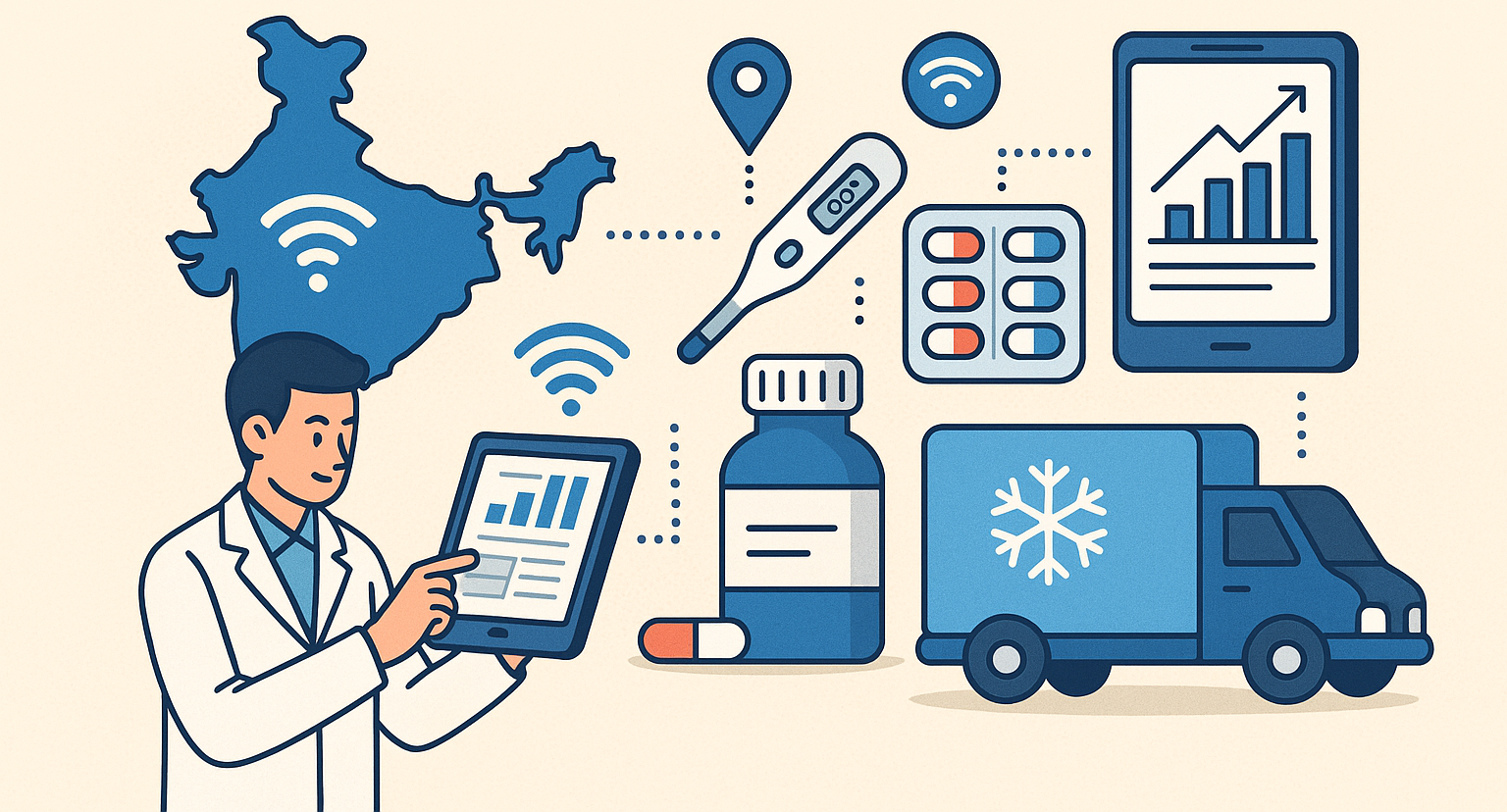Blog on RFID Technology and IoT Solutions
Blog Home
Top 7 Benefits of IoT Solutions for Singapore’s Pharma Industry
20 August 2025Singapore, the biomedical hub of Asia, has some of the world’s leading pharmaceutical companies and research institutions. Situated in the middle of two continents, proud infrastructure, and innovation-promoting government-funded policies, Singapore’s pharma industry is ready to dominate the region in digital growth.
At the forefront of this revolution lies the Internet of Things (IoT) — an interconnectivity of sensors, machines, and systems to capture and process real-time data. As regulatory demands, patient expectations, and global competition are growing, IoT has become an imperative catalyst for intelligent manufacturing, compliance, and supply chain optimization in Singapore’s pharma industry.
Let’s dig deeper into the top 7 benefits of IoT solutions for Singapore’s pharma industry.
1. GMP Facilities’ Real-Time Environmental Monitoring
Pharmaceutical manufacturing requires strict control of environmental parameters such as temperature, humidity, and air pressure, especially cleanrooms.
How IoT Assist:
IoT sensors monitor these parameters continuously and send real-time alerts in case of any deviation. The data is automatically logged for auditing and compliance.
Benefit: Better management of product quality, reduced risk of batch contamination, and simple audit preparedness for HSA and worldwide authorities like US FDA or EMA.
2. Preventive Maintenance of Key Equipment
Downtime of equipment like reactors, filling machines, or HVAC can lead to costly delays and product loss.
How IoT Benefits:
Smart sensors on equipment track vibrations, temperature differences, and energy usage to foresee potential failures well in advance.
Advantage: Reduced downtime, reduced disruption, and improved overall equipment effectiveness (OEE).
3. Enhanced Supply Chain Visibility
Singapore is one of the largest pharmaceutical export hubs. The integrity of drugs needs to be maintained across borders.
How IoT Benefits:
GPS tracking and temperature/humidity sensors integrated into logistics systems provide real-time information along the supply chain.
Advantage: Real-time tracing, improved risk management, and compliance with cold chain regulations, especially for vaccines and biologics.
4. Automated Quality Control and Assurance
Traditional QA/QC processes normally comprise manual verification and paper-based records — both vulnerable to errors.
How IoT Helps:
IoT-enabled equipment can detect any formulation deviation, fill weight variation, or packaging integrity issues in real-time.
Benefit: Enhanced production accuracy, reduced waste, and faster batch release cycles.
5. Regulatory Compliance and Data Integrity
In a highly regulated industry, accurate and complete records are required for audits and inspections.
How IoT Helps:
IoT devices produce secure, time-stamped logs that fulfill ALCOA+ principles (Attributable, Legible, Contemporaneous, Original, Accurate, Complete, Consistent, Enduring, and Available).
Benefit: Simple compliance with Singapore’s HSA, GMP guidelines, and international regulations, without sacrificing manual record-keeping.
6. Remote Monitoring & Control
In a post-pandemic world, remote operation is a necessity — not an aspiration.
How IoT Assist:
Platforms built with IoT empower engineers, quality teams, and plant managers to remotely monitor manufacturing and warehouse conditions via cloud dashboards and mobile apps.
Advantage: Increased operational agility and faster response to deviations or emergencies.
7. Data-Driven Decision Making with AI & IoT Integration
The true strength of IoT is the data it generates — and how it comes to be used.
How IoT Helps:
With AI and analytics, pharma companies can better visualize production trends, process delays, and projected demand.
Advantage: Smarter decision-making, improved resource management, and more robust operations.
Singapore’s Strategic Edge in Smart Pharma
Singapore’s government has launched initiatives like the Smart Industry Readiness Index (SIRI) and offers strong support via EDB (Economic Development Board) and A\ STAR to facilitate adoption of Industry 4.0 technologies, including IoT in pharma.
The country’s strong digital infrastructure, skilled workforce, and hospitality regulation make it an ideal testbed for IoT innovation in pharmaceuticals.
Final Thoughts
Embracing IoT for Singapore’s pharma sector is not only a trend but a strategic move towards resilience, global competitiveness, and regulatory excellence. From intelligent manufacturing via cold chain logistics and quality monitoring, the benefits of IoT are widespread and measurable.
As digitalization continues to reshape the pharma space, Singaporean businesses that embrace IoT today will be the ones leading the pack tomorrow.
Ready to make your pharma operations smarter and more compliant with IoT?
We can tell you if you’d like a Singapore-specific regulatory environment checklist, case study, or implementation guide.
- Intellistride.com
- Blog
- Top 7 Benefits of IoT Solutions for Singapore’s Pharma Industry